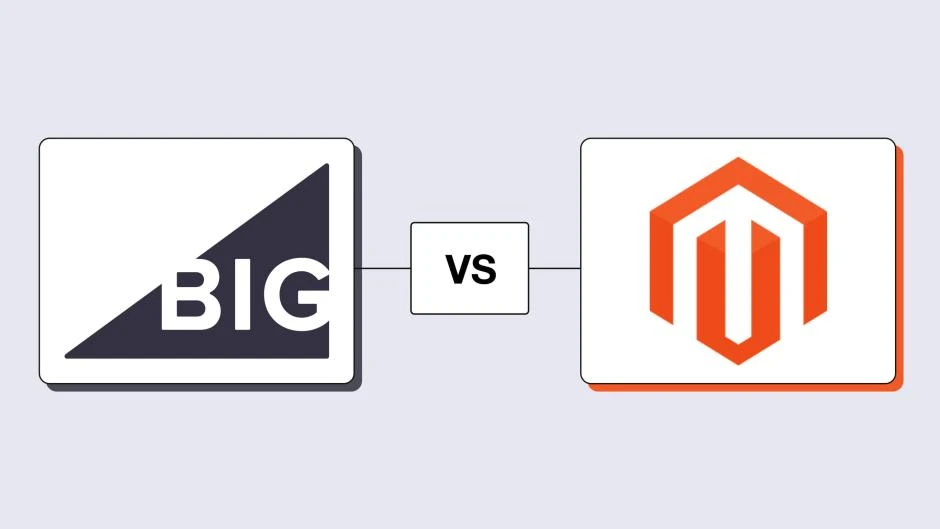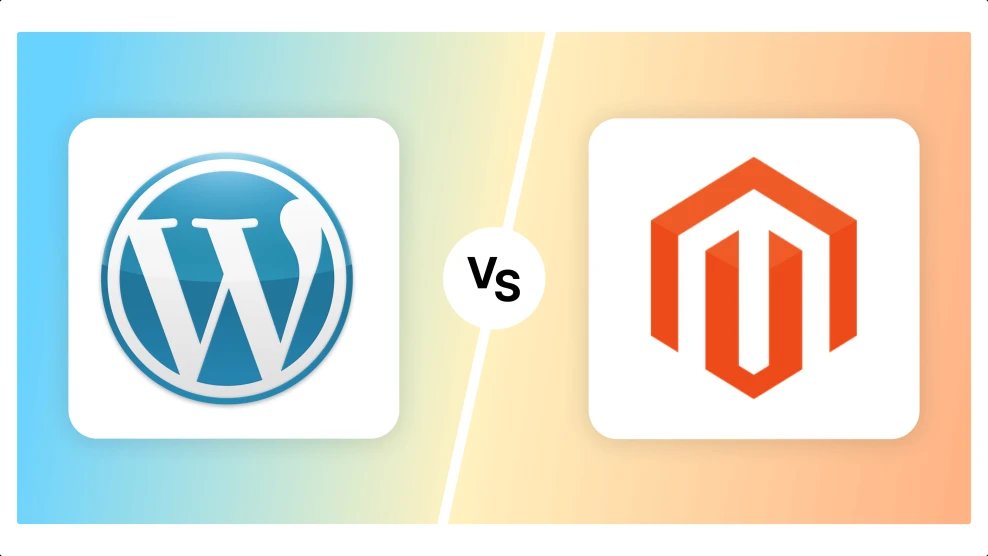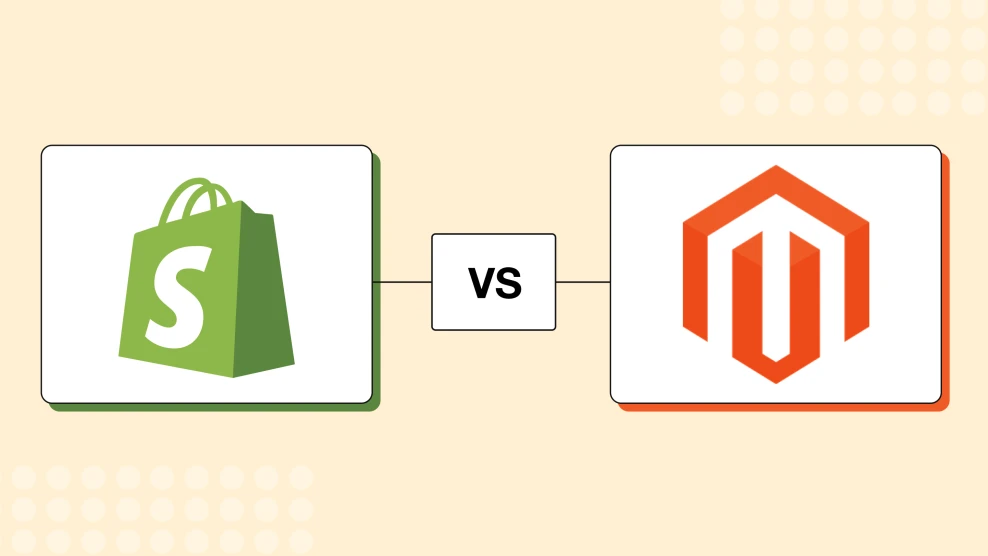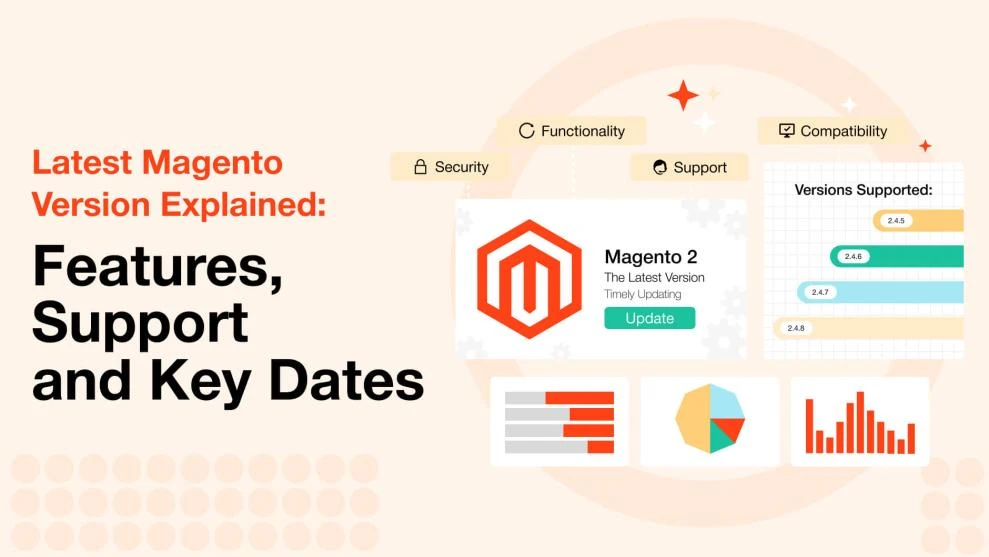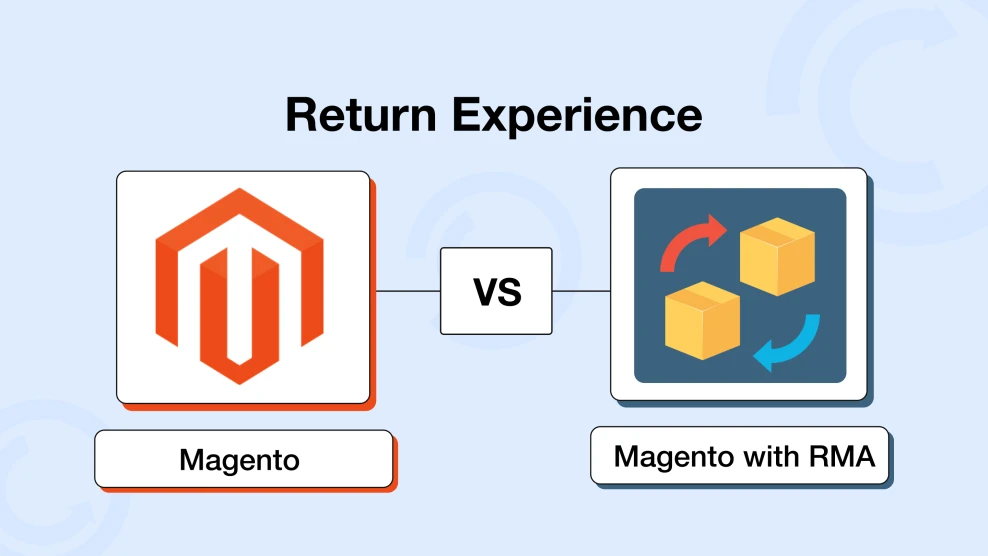BigCommerce vs Magento: Which Platform is Right for You?
-
 Oleksandra Petrenko
Oleksandra Petrenko
- Magento 2
- 13 min read
Various e-commerce platforms can feel like a maze for enterprises looking for the perfect platform to launch and operate their digital storefront. Two industry titans, BigCommerce and Magento, constantly vie for the top spot. But with distinct advantages and considerations, picking the right solution hinges on understanding your specific needs.
This in-depth guide will equip you with the knowledge to confidently navigate this critical decision. Mirasvit's experience provides a unique perspective, especially for those considering Magento 2. We'll delve into the core functionalities, design flexibility, prices, and support structures of both platforms.
What is Magento?

Magento 2 empowers businesses to create powerful e-commerce experiences with its open-source platform. Unlike BigCommerce's hosted solution, Magento 2 offers greater flexibility and control, empowering enterprises to personalize their digital storefronts. Let's delve deeper into what makes Magento 2 such a compelling contender:
Unparalleled Flexibility
Magento's open-source nature unlocks a treasure trove of customization opportunities. The platform's core code can be modified, and a vast ecosystem of external add-ons from various developers extends functionalities even further. Magento 2 empowers enterprises to create a truly unique online store experience that shows their brand identity and addresses unique customer needs.
Feature-Rich Foundation
Magento 2 boasts a robust set of features that cater to complex business requirements. Inventory management, a powerful SEO toolset, robust marketing automation, and a secure payment gateway infrastructure are just a few highlights. This comprehensive feature set allows companies to hit the ground running without broad customization in the initial stages.
Scalability for Enterprise Growth
Magento 2 is built to scale alongside your enterprise. Its architecture handles a lot of traffic and easily manages huge catalogs. This creates a future-proof solution for brands with ambitious plans. Whether you're a startup or a well-established enterprise, Magento 2 can adapt to your evolving needs.
What is BigCommerce?

BigCommerce simplifies the journey of launching and running your online store with its user-friendly, cloud-based platform. Here's what makes BigCommerce so popular:
Speed and Efficiency
Unlike self-hosted platforms, BigCommerce operates on a cloud-based infrastructure. This architecture eliminates the pressure of server maintenance and software updates for vendors. The platform handles all of these aspects, so you can focus on operating your shop. Furthermore, the cloud-based infrastructure ensures scalability and can seamlessly adapt to accommodate traffic spikes and growth in your goods catalog.
Interface
BigCommerce prides itself on its simple interface, excellent for vendors with limited tech experience to launch and maintain their storefronts. This user-friendly approach empowers brands to shorten time to market, without extensive coding knowledge.
Comprehensive Feature Set
BigCommerce possesses a robust suite of features that cater to essential needs for operating an online shop. Native SEO tools, marketing automation functionalities, and analytics dashboards equip companies to refine their operations and drive sales. This eliminates the immediate need for wide adjustments and integrations, allowing companies to launch their websites efficiently.
Magento and BigCommerce Comparison
1. Price
Choosing a platform to develop your store involves more than just features and functionalities. Understanding the cost structures of BigCommerce and Magento 2 is crucial to aligning the choice with your budget. Let's delve into the pricing models:
BigCommerce
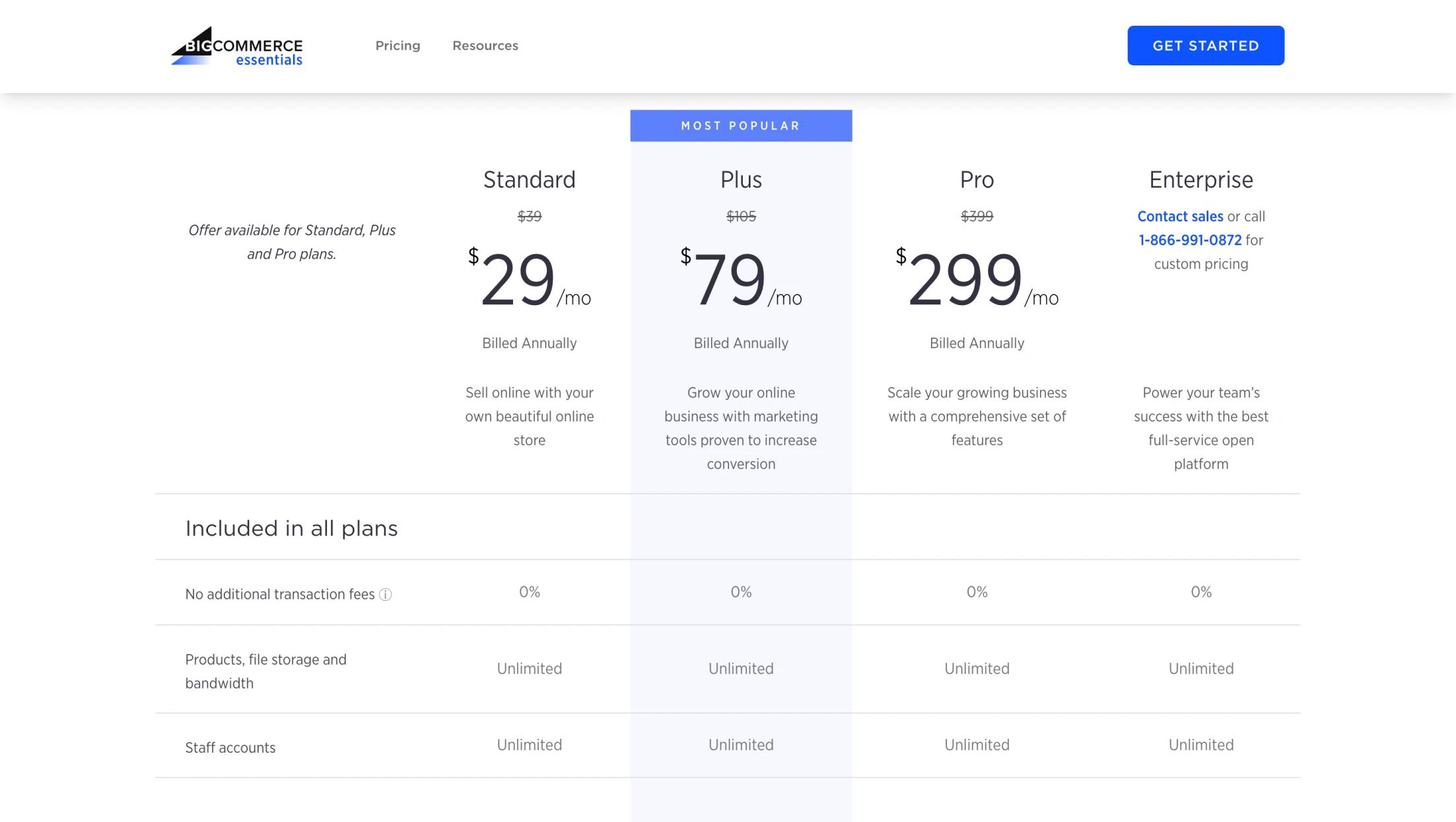
It has a structure with tiered pricing and clear monthly fees. These plans include hosting, security, essential tools, and functionalities. Here's a quick breakdown:
- Standard Plan (starts at $79.95/month): Great for startups and beginner businesses, this plan offers basic e-commerce features to establish your shop.
- Plus Plan (starts at $299.95/month): This plan is ideal for growing businesses. It offers all the fundamental features you need, plus valuable tools like customer grouping, cart recapture, and enhanced data insights.
- Pro Plan (starts at $399.95/month): Ideal for medium-sized businesses, this plan builds on the Plus Plan's features with powerful additions like product filtering for enhanced navigation, Google Customer Reviews integration to boost trust, and a custom SSL certificate for top-notch security.
- Enterprise Plan (Custom Quote): Created for big enterprises with high turnovers, this plan offers a custom solution with specialized functions and pricing adjusted to meet specific needs.
Transaction fees are typically ranging from 1.5% to 2.5% per transaction. BigCommerce also offers a transparent pricing structure, so you can easily calculate the ongoing costs associated with your sales volume.
Magento
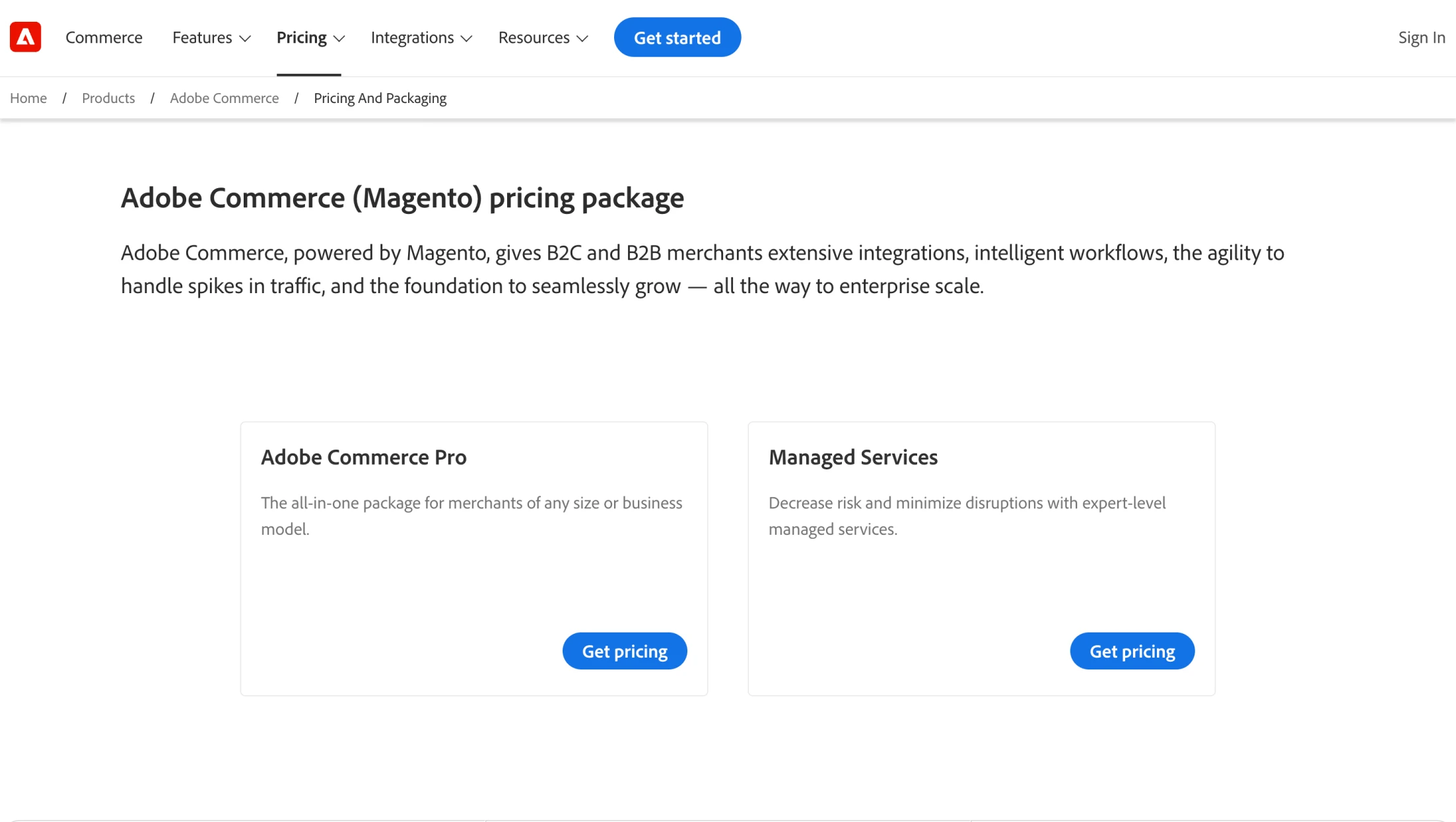
The platform’s code is open to everyone and has no base licensing fee. However, this benefit comes with extra cost considerations:
- Hosting: You'll need to secure your own web hosting, with costs varying with different providers. Factors like bandwidth requirements and server security will influence the pricing.
- Extensions: Magento has an enormous marketplace of extensions that can enrich core platform functionality and add new features.
- Development: Extensive customization often requires developer skills. If you don't have an in-house development team, you'll need to factor in the cost of hiring a tech expert or a development agency to create unique solutions.
While Magento 2 offers significant flexibility, the potential for extra costs in hosting, extensions, and coding can make it a more expensive choice than BigCommerce's all-inclusive monthly plans.
2. Ease of Use
BigCommerce
This platform champions simplicity. Creating your shop, expanding your catalog, and managing your inventory can be done with minimal effort. BigCommerce is a nice choice if you prioritize a user-friendly experience and a quick launch for your digital storefront.
Magento
While Magento offers a robust feature set, but harder to master compared to BigCommerce. Technical knowledge or experience with other solutions can be beneficial to processing the platform and unlocking all of its possibilities. However, Magento 2 does offer detailed documentation and tutorials to help users learn the ropes.
3. Store Design
As for crafting the visual identity of your digital storefront, both BigCommerce and Magento 2 offer distinct approaches:
BigCommerce:
- Pre-Designed Themes: This platform has a library of pre-designed themes for different industries and aesthetics. These themes are customizable to a certain extent, and you can modify colors, fonts, and logos to match your brand identity.
- Limited Customization Freedom: While it is easy to use and modify themes, extensive design customizations might be harder to achieve. If a brand has a highly unique vision for web design, BigCommerce might pose some limitations.
Magento 2:
- Unparalleled Customization: Design flexibility is one of the core features of Magento. The open-source nature allows for deep personalization of the front-end design. You can modify the core theme files to develop a truly unique and personalized online store experience.
- Theme Development Requires Expertise: Unlocking full design potential requires tech expertise. Extensive design customization can be challenging if you don't have in-house developers or a budget for external services. However, a vast marketplace of themes offers a variety of pre-built options.
4. E-commerce Features and Tools
Equipping your website with proper functionalities is essential for driving sales and streamlining operations. Let's see how BigCommerce and Magento stack up in this critical area:
BigCommerce:
BigCommerce comes loaded with a variety of features you can use from the start. These tools include:
- SEO tools: Optimize your product listings and website content for search engines to improve organic traffic. Marketing automation tools: Create automated email campaigns, abandoned cart recovery sequences, and targeted promotions to nurture leads and convert sales.
- Inventory tools: Track product stock levels, manage product variants, and set up automated reordering to ensure you never run out of inventory.
- Analytics dashboards: Gain insights into customer journeys, traffic sources, and sales performance to refine your marketing strategy.
BigCommerce possesses a robust set of functions, but compared to Magento the level of customization for these functionalities might be limited.
Magento
Magento has a vast array of tools, both built-in and external. This opens for a more granular approach to adjusting your site’s functionalities to your specific needs.
Magento offers functionalities like SEO tools, marketing automation, inventory management, and analytics dashboards. For instance, SEO tools might allow for advanced meta tag editing and sitemap management, while marketing automation might offer features like customer segmentation and personalized email marketing campaigns.
Extensions can add additional features like advanced search, loyalty programs, product recommendations, advanced product filtering, and much more.
5. Performance and Security
A smooth-running and secure online store is essential for client satisfaction and keeping a positive brand image. Let's see how BigCommerce vs Magento 2 handles these critical aspects:
BigCommerce:
- Scalable Cloud Infrastructure: This ensures scalability to handle traffic spikes and growth in your goods catalog without compromising performance. BigCommerce manages server maintenance and software updates, so you can focus on running your store.
- Built-in Security Features: The platform prioritizes security with Secure Sockets Layer (SSL) encryption, firewalls, and intrusion detection systems to safeguard your store and customer data. Automatic security updates ensure your platform remains protected against evolving threats.
- Limited Server Control: Since it is a hosted solution, you have less control over server-level configurations that might impact performance in very specific scenarios.
Magento:
- Potential for High Performance: When properly configured and optimized, this platform can achieve high-performance levels. But, you will need technical expertise for server management, caching optimization, and ongoing maintenance.
- Security Requires Vigilance: While Magento 2 offers various security features, the open-source code places the onus of security on the vendor. Regular updates, security patching, and potential investment in additional security measures are important for maintaining a secure platform.
6. Payment Options and Fees
Offering secure payment options is necessary for a smooth checkout experience for your customers. Let's explore how BigCommerce vs Magento handles payment processing:
BigCommerce:
- Limited Payment Gateway Options: BigCommerce provides a selection of pre-integrated payment gateways. While this covers the most popular options, it might not include every niche payment processor you might require.
- Transaction Fees: The platform applies transaction fees that vary on different plans. These charges typically range from 1.5% to 2.5% per transaction.
- Potential for Additional Costs: If the pre-integrated payment gateways don't fulfill your needs, integrating a third-party processor might incur additional development costs.
Magento:
- Broader Choice of Payment Gateways: With its open-source code, Magento offers a broader selection of payment gateways with extensions. You can integrate with specific processors that cater to your niche or geographical location, potentially offering lower transaction fees.
- Transaction Fees: These depend on the payment gateway and its pricing structure. You might be able to negotiate lower fees with some processors due to the platform’s flexibility.
7. Marketing Tools and Features
Solid marketing tools are the key to driving sales and brand awareness. Let's see how Magento 2 vs BigCommerce equips you to reach your target audience:
BigCommerce:
- Email Marketing: Create and send targeted email campaigns to promote products, announce sales, and nurture leads.
- Social Media: Integrate your store with media platforms to share products and engage with your audience.
- Customer Groups: Segment your client base to create targeted promotions and marketing campaigns.
- Abandoned Cart Recovery: Automate emails to remind customers about abandoned carts and encourage them to complete their purchases.
While BigCommerce's built-in tools offer a good starting point, advanced marketing automation functionalities might be limited.
Magento:
Magento 2 has a solid foundation for marketing automation. However, to unlock its full potential, you need to install extra modules:
- Marketing Automation Extensions: A vast choice of add-ons empowers you to implement features like personalized product recommendations, loyalty programs, and omnichannel marketing campaigns.
- CRM Integrations: Integrate your store with Customer Relationship Management (CRM) platforms to gain a deeper understanding of your customers and personalize marketing efforts.
8. Help and Support
Running a successful online store often requires navigating challenges and troubleshooting technical issues. Let's see how Magento vs BigCommerce grants support:
BigCommerce:
- Knowledge Base: This platform provides a well-stocked knowledge base filled with articles, tutorials, and FAQs to answer common questions and guide you through platform functionalities.
- 24/7 Customer Support: Customer support via live chat, email, and phone, ensuring you can get help whenever you need it.
- Limited Community Support: BigCommerce doesn't have a dedicated user forum or community, which can be a drawback for seeking peer-to-peer advice or troubleshooting specific issues.
Magento:
- Extensive Documentation: The platform boasts detailed documentation covering various aspects, from core functionalities to advanced configuration options. This is a valuable resource for developers and technically savvy users.
- Active User Community: A vibrant online community of Magento users exists across forums and online platforms. This allows you to connect with other users, seek troubleshooting advice, and learn from shared experiences.
- Limited Support Options: While Magento offers some documentation and community support, official support options like live chat or phone support might be limited or require additional fees depending on your chosen plan.
Choosing Your E-commerce Platform: BigCommerce vs Magento
Here's a step-by-step guide to help you pick the right platform between BigCommerce and Magento:
1. Consider the Size:
- Small/Medium Business? BigCommerce is a great choice! It's easy to use and quickly grows for expanding businesses.
- Large Enterprise? Considering BigCommerce vs Magento Enterprise, keep in mind that the latter offers wide customization and scalability for complex needs.
2. Technical Expertise Check:
- Limited Tech Knowledge? BigCommerce's interface is ideal for beginners.
- Comfortable with Coding? Magento offers precise control and personalization but requires some technical skills.
3. Budget in Mind:
- Predictable Costs? BigCommerce offers clear monthly plans.
- Open to Investment? Magento Open Source is free, but you need to factor in hosting, development, and potential extension costs. Magento Enterprise has licensing fees on top of those considerations.
4. Feature Needs Assessment:
- Basic Features Sufficient? BigCommerce provides a solid native feature set.
- Advanced Functionalities Required? Magento possesses a huge range of functionalities through extensions.
5. Consider Options:
- MageOpen Source: Highly customizable and free, you will need to employ technical skills for management.
- Magento Enterprise: Paid option with premium features, dedicated support, and focus on security for large enterprises.
6. Prioritize Performance and Security:
- Ease of Use with Security? BigCommerce is easy to use with built-in security features.
- High Performance Needed? Magento has the potential for high performance with proper configuration but requires more technical expertise to optimize security.
7. Payment Processing Partners:
- Limited Gateway Needs? BigCommerce provides a good selection of pre-integrated gateways.
- Specific Processors Required? Magento allows for a wide range of integrations through extensions but might require development skills.
8. Marketing Goals in Focus:
- Basic Marketing Tools Enough? BigCommerce provides email marketing tools and social media integrations.
- Advanced Marketing Automation Needed? Magento provides a foundation for advanced marketing with extensions but might require tech experience or development services.
9. Support System Evaluation:
- Readily Available Support? BigCommerce provides customer support 24/7.
- Dedicated Support Preferred? Magento Enterprise has priority support options but at an additional cost. Magento Open Source relies on user communities and self-service resources.
By following these steps and carefully considering your needs, you will easily make the right choice and pick the platform that empowers your brand’s success!
Conclusion
BigCommerce and Magento offer great opportunities, but the best fit depends on you. Remember the following factors:
- Ease of Use: BigCommerce is suitable for beginners. Magento requires more technical knowledge.
- Budget: BigCommerce offers predictable monthly plans. Magento Open Source is free, but you need to factor in hosting, maintenance, and extensions. Magento Enterprise has a licensing fee on top.
- Features: BigCommerce has built-in features. Magento offers a wider range through extensions. Magento Enterprise includes B2B functionalities.
- Support: BigCommerce provides 24/7 support. Magento Open Source relies on communities, while Enterprise offers dedicated support.
If you're leaning towards Magento but technical limitations are a concern, explore additional modules. Mirasvit offers a wealth of extensions that can add various functionalities to your Magento store, reducing the need for extensive custom development. Our expertise can bridge the gap between your desired feature set and your technical capabilities.
Ultimately, the decision between BigCommerce vs Magento hinges on your specific requirements. Carefully consider your needs and don't hesitate to reach out to Mirasvit if Magento's customizability tempts you but technical limitations hold you back.
Frequently asked questions about BigCommerce vs Magento
1. Which platform is easier to use: Magento or BigCommerce
BigCommerce is considered easier to use, with its user-friendly interface and drag-and-drop functionality. Magento requires more tech skills for customization and maintenance.
2. What is cheaper: BigCommerce or Magento
BigCommerce offers predictable monthly plans with ready-to-use features. Magento Open Source is free, but extra bucks for hosting, maintenance, and development can land in your monthly spending. Magento Enterprise has a significant licensing fee on top of those considerations.
3. What features Magento and BigCommerce have
Both platforms have a powerful toolset, but Magento provides a wider selection through extensions. Magento Enterprise includes even more capabilities to address complex business needs.
4. What kind of support do I get with Magento and BigCommerce?
BigCommerce provides readily available 24/7 customer support. Magento Open Source relies on user communities and self-service resources. Magento Enterprise provides dedicated support with faster response times but at an additional cost.

